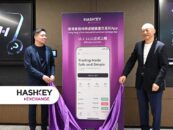
South Korea to Test Digital Won with 100,000 Citizens in CBDC Pilot Next Year
by Fintech News Hong Kong November 27, 2023South Korea is preparing to launch a pilot programme for a central bank digital currency (CBDC) involving 100,000 citizens, as reported by The Korea Times.
This initiative, planned for the fourth quarter of next year, is a collaborative effort between the Bank of Korea (BOK) and financial authorities including the Financial Services Commission (FSC) and Financial Supervisory Service (FSS).
Selected individuals will have the opportunity to use deposit tokens. These tokens, issued by commercial banks in the form of a CBDC, will function similarly to vouchers, enabling participants to purchase goods.
The selection process for participants will be conducted by various commercial banks, with recruitment expected to occur around September to October of the following year.
CoinDesk adds that potential locations for this pilot programme could include Jeju, Busan, or Incheon, as per its own earlier reports.
The BOK perceives the CBDC as a potential remedy for issues plaguing current government grant systems, such as those used during the COVID-19 pandemic and for childcare vouchers. These issues encompass high transaction fees, slow settlement processes, and concerns about fraud.
As part of its first phase of CBDC testing, South Korea completed testing functions like issuing and distributing a CBDC in a simulated environment by December 2021.
The plan was shared during Bank for International Settlements’ (BIS) General Manager Agustín Carstens visit to BOK for the CBDC & Future Monetary System Seminar in Seoul on Thursday (23 November 2023). Carstens had shared the stage with Governor Rhee Chang-yong to discuss collaborative efforts on CBDCs.

Agustín Carstens
“The project brings together the Bank of Korea with the other key regulatory bodies in Korea, the Financial Services Commission and the Financial Supervisory Service. Other government agencies have been consulted and are on board. Legal questions have been, or are being, addressed. The banking sector is involved. As are other financial intermediaries.
This type of cooperative approach is crucial if a vision like a unified ledger is to be realised. Without this, I fear that we would end up with a fragmented, siloed system with many of the flaws we see in today’s financial system still unresolved. Whatever its technical sophistication, that would be a big missed opportunity,”
Carstens said in his speech.
Featured image: Bank of Korea’s Governor Rhee Chang-yong and BIS’ General Manager Agustín Carstens.








